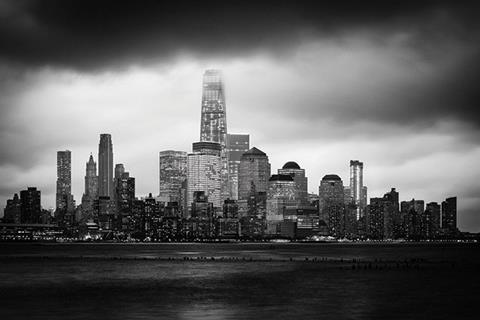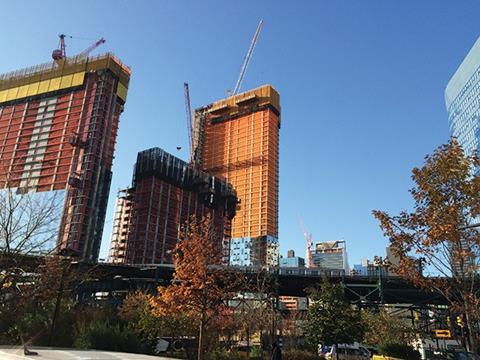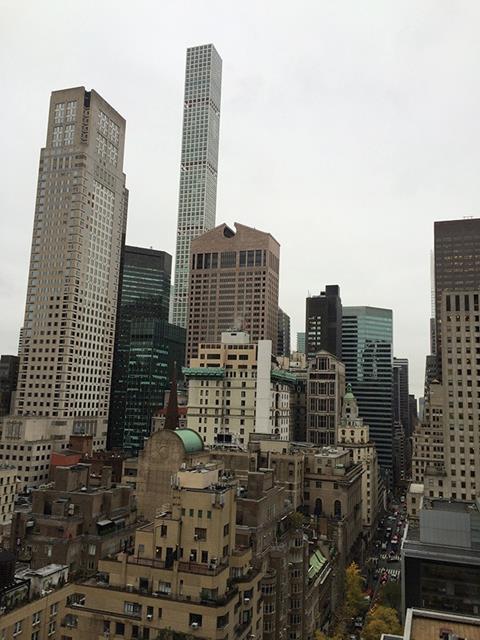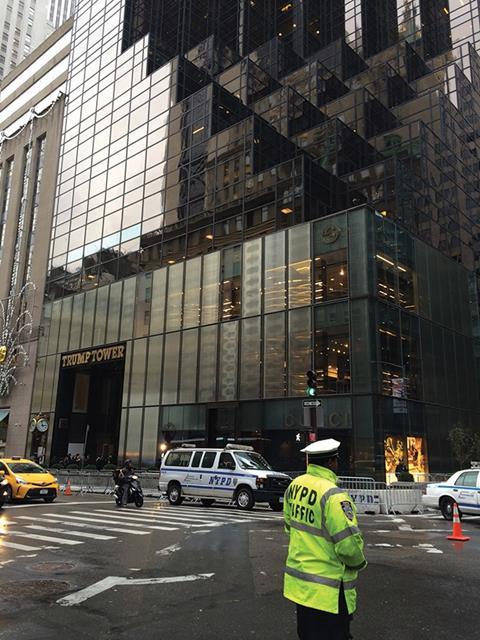New Yorkers are still in shock at the idea of a Trump presidency, but some of those working in construction concede that having in the White House a New York property mogul with a $1tn infrastructure spend on his mind may not be all bad news. Iain Withers visited the city that never sleeps in the week after Trump’s victory

Carlos Valverde grew up in Mexico City before moving to the United States in 2002 to study architecture in Boston. Today he is a construction manager on the US’ most high-profile and emotionally-charged project – the rebuilding of the World Trade Center in New York.
Standing in the foyer of WTC4, the third of five towers to be built on the site of the devastating 9/11 attacks, he speaks of the “immense pride” he takes in his role and in helping repair this damaged piece of the American psyche. Yet as a part-Hispanic man in a country that’s just voted Donald Trump as its next president – a man who won the White House while fanning racial hatred towards Mexicans with warnings of immigrant “rapists” and “criminals” – he is in a sombre mood.
“It’s hard to understand how someone with such extreme views could win,” Valverde says, speaking up above a thunderstorm raging outside in lower Manhattan. “It’s just incredible. We’ve got to be ready for whatever’s gonna hit us.”
In a visit to New York in the week after Trump’s shock election victory, Building found a city gripped by a collective nervous breakdown. Rolling protests were taking place outside Trump Tower, with protesters holding aloft banners comparing their new president to a Nazi, while the man himself hunkered down inside making controversial far right appointments to his incoming White House team. Thousands of alarmed New Yorkers were writing messages of peace, love and solidarity on Post-it notes plastered across the subway. And most New Yorkers I spoke to expressed their fear and disbelief at the election outcome – some even comparing the mood in the city with that after 9/11. In this most liberal of cities, you were hard pressed to find anyone willing to admit they had voted for Trump.
New York’s construction community were generally just as dismayed by the political earthquake, at least on a personal level. But from a professional perspective, some were starting to see positives as well as negatives to having a property mogul with a $1tn infrastructure plan moving into the White House. In recent years a number of British firms and global companies with sizeable UK divisions – including consultants Gardiner & Theobald (G&T), Turner & Townsend (T&T), Gleeds and WSP Parsons Brinckerhoff (WSP PB), through to architects such as Foster + Partners and Scott Brownrigg – have been growing market share in the Big Apple.
So how are New Yorkers, including the Brits in Manhattan, digesting the prospect of a Trump presidency? Do they think they can work with, and even help make a success of, a Trump presidency? British firms also reveal their tips on how to break into one of the world’s most exclusive construction markets (see below).

Coming to terms with a Trump presidency
In common with most US cities, particularly on the east and west coasts, New York backed Hillary Clinton over Trump by an overwhelming margin, and is struggling to come to terms with a Trump victory. Christopher Blackadder, New York director for UK architect Scott Brownrigg, is quick to point out that as an Australian raised in Sydney he cannot vote. But he has lived in New York for the past 16 years and eloquently describes the mournful mood that has descended on the city. “It’s been awful. People have been very down and unsure of what the future will bring,” he says. He is not the only New Yorker to evoke 9/11: “After September 11th people would look each other in the eye with a look like they had both been through a tragedy together … Since the vote [it’s been like that] … there has been a lot of kindness for strangers. If your subway card didn’t work, someone would step in. People are looking each other in the eye and looking out for each other.”
Trump has a platform of very positive things [but] it will take some new thinking in the political establishment
John robbins, Turner & Townsend
Some New Yorkers are so shaken by Trump’s victory that they can barely speak about it. One group of construction professionals I talk to say that they and many of their fellow New Yorkers have adopted an attitude of not doing anything that could be construed as “normalising” Trump’s victory – and that includes being quoted on the record in a British trade magazine on the subject. One says: “The whole thing is just really weird. It’s not a conversation topic in New York. It’s a bold move socially to even make a joke about it. In the office I don’t talk about it.”
Among progressive New Yorkers you frequently hear people say they will become more politically engaged and take political action in response to Trump’s win, such as attending protest marches planned for Washington DC in the lead-up to his inauguration in January. Valverde – who works for World Trade Center developer Silverstein Properties – is concerned about the impending Trump presidency and does “not agree with a lot of his policies”, but gives a cautious assessment of the future. “People just need to wait and see what’s going to happen,” he says. “Even six months later it will be unclear what the outcome is.”

For the New York development world at large, the unusual thing about this incoming president is that they actually know him well – many in their ranks have dealt with Trump and his property development company, the Trump Organization, on numerous projects throughout the city, including the many towers that bear his name. Those who have worked with Trump directly tend not to have a bad word to say. Two such construction professionals who have known Trump for many years, but prefer not to be named due to their ongoing business dealings with the Trump Organization, which will continue on under the management of his children, share fairly glowing assessments. One describes Trump as “an ambitious guy who knows how to resource talent,” while another says they found him to be an effective client: “He’s a very smart guy. He wouldn’t be able to develop what he did if he wasn’t a winner … I don’t think he is evil. Sure he’s not a perfect person. He’s driven to win.” Meanwhile, John Robbins, the American managing director for T&T’s US business – who has also “watched him in action”, having sat across the negotiating table from a “very actively engaged” Trump on a leasing deal for a private school – strikes an optimistic note despite voting for Clinton. “America eventually comes together,” he says. “At some point you have to get behind your commander in chief … Why wouldn’t you want him to be successful? For yourself and your family?”
Doing business with Trump
When it comes to the prospect of doing business with a Trump presidency, there is also more optimism. The irony of rust belt America voting in a New York property developer whose professional attention has never strayed far from his home turf, or other affluent US cities, is not lost on anyone. The general view is that having a New Yorker in the White House is good news for New York.
T&T’s Robbins believes Trump will have “an overall positive effect” on US business, adding: “Trump has a platform of very positive things.” Among these things, he believes Trump’s $1tn (£780bn) America’s Infrastructure First programme can “absolutely” be delivered. “It will take some new thinking in the political establishment,” he says, “but Trump brings that outside business thinking … It will be nice to see a different approach to growth in American business.”
The need for more private investors and private expertise to deliver the $1tn plan opens up opportunities for British consultants, particularly those with experience working on private-public partnership schemes in the UK. T&T’s Murray Rowden, who moved to New York earlier this year to take on the additional role of managing director of the firm’s North America division, on top of his existing role of global head of infrastructure, certainly sees potential for the firm in PPP in Trump’s America, as well as in infrastructure more generally. He says T&T sees “great growth opportunities” in US airports, high-speed rail and asset management for infrastructure clients, and says US public clients are particularly interested in British successes such as the “Crossrail story” of using local business taxes to fund infrastructure projects.
G&T is another of the big British success stories in New York – the firm has managed as much as $5bn (£3.9bn) of development work through its Manhattan office, including the $2bn (£1.6bn)revamp of the United Nations building and cost and project managing the Fosters and WSP PB-designed 425 Park Avenue skyscraper. The firm’s US managing director Andrew Mann says he favours a pragmatic approach to dealing with Trump’s new team. “People have got to get on with it and work with them,” he says. He believes Trump’s win is good news for the New York property market: “Trump will reduce the regulations on financial institutions, which is a key growth driver for New York. He’s also business friendly – he wants to do a lot of infrastructure, although the Senate was concerned about the cost of that when Obama proposed it.”

Some industry leaders warn that any construction impact – positive or negative – from a Trump presidency will be a long time coming. Adnan Malik, a British director who has worked for consultant Gleeds in New York for 14 years, explains: “We’re not going to see any of the impact of his policies until 2018 at the earliest. They have to go through the House and the Senate and won’t impact until much later.”
Malik’s US colleague, Dana Martinez, Gleeds vice-president in New York, also welcomes Trump’s $1tn (£780bn) infrastructure plan, saying investment in US roads, railways and airports is “badly needed”. But he raises concerns about other Trump policies, including the prospect of tariffs being slapped on imports, including cheap Chinese steel. He says:
“If tariffs come in, that could potentially stop construction work. If raw steel costs around $500 (£392) a tonne now and that goes up 50% over night, it could have a drastic impact on construction.”
For Scott Brownrigg’s Blackadder, the terribly divisive Trump victory has caused him a management headache, even within his small eight-person Manhattan team. Unusually for a New York architecture practice there is an unembarrassed Trump voter among their number, creating potential tension with colleagues who backed Clinton. “It’s a situation you have to manage as emotions are raw,” he says. “We had a staff meeting on Friday [after the vote] where I just reiterated that we all live and work in a great city; to focus on the positive things that we have rather than things that are out of our control.” Whether or not New Yorkers, and an incoming president Trump, can begin to heal the wounds of 2016 next year remains to be seen.
Making it in Manhattan: Top tips from British firms
Be local
Unlike in many global markets, British firms in New York are shy about marketing their Britishness. While some clients do value British expertise, it is knowing New York, and Manhattan in particular, that is prized above all else. G&T’s Mann takes pride in the fact that 95% of the consultant’s clients are local to New York. “There’s a graveyard of British consultants who come over here with British developers, and when the client pulls out they collapse,” Mann warns. T&T’s Robbins joined the British consultant through the takeover of his boutique Manhattan practice, Ferzan Robbins, five years ago. He says Manhattan has a “small town feel” that’s “relationship driven”. “In 10 to 15 years you get to know everybody,” he adds. Although Scott Brownrigg’s Blackadder is a veteran of 16 years in Manhattan, he warns that an outsider Aussie such as himself can only get so far: “The biggest gap is high school and college, those people who’ve lived next to each other on Long Island for years and are now working in the city.”
Speed up
If you’re going to get into construction Stateside, you’re going to have to speed up. When you ask Brits in New York what the main difference is between working there and in their home market, the answer is always the same. “Construction is faster here by far,” says G&T’s Andrew Mann. “Time is money.” If you want to gain an appreciation for the finely-tuned Manhattan machine, T&T’s Murray Rowden suggests “getting up at 3 or 4am and watching the whole logistics delivery from a tall building in Manhattan in action – you see convoys of construction traffic, delivery lorries and so on winding onto the island for as far as the eye can see before the rest of us are even up and about. It’s amazing.”
Understand the planning system
New York’s planning system is more conducive to rapid construction than, say, London’s. While there are some protections for landmark buildings, generally speaking so long as you comply with the zoning requirements (eg residential, commercial) and the NYC Department of Buildings’ suggested floor area ratio (FAR) governing maximum height for the site, you can build whatever you want.
You can even buy air rights from neighbouring buildings in order to go taller. Gleeds’ Dana Martinez also points out that unlike in the UK, developers can get approval for “foundations packages” that enable them to get building before schematic designs are even on the drawing board for the above-ground works. “On a lot of big projects we put in foundations before we really know what we are doing,” Martinez says.
Enjoy it
G&T’s Mann, who set up the consultant’s New York business 23 years ago, can barely contain his enthusiasm for the city. “I love New York. Very few places would give the opportunities New York has. If you do a good job, if you perform and deliver, you’ll get on well in the New York market.” He adds: “Everyone in construction wants to do a New York tower. The can-do energy here is infectious.” Scott Brownrigg’s Blackadder has considered relocating to warmer, more relaxed climes with his family, such as California or a move back to Australia, but simply says: “I’d miss New York too much.”



























No comments yet